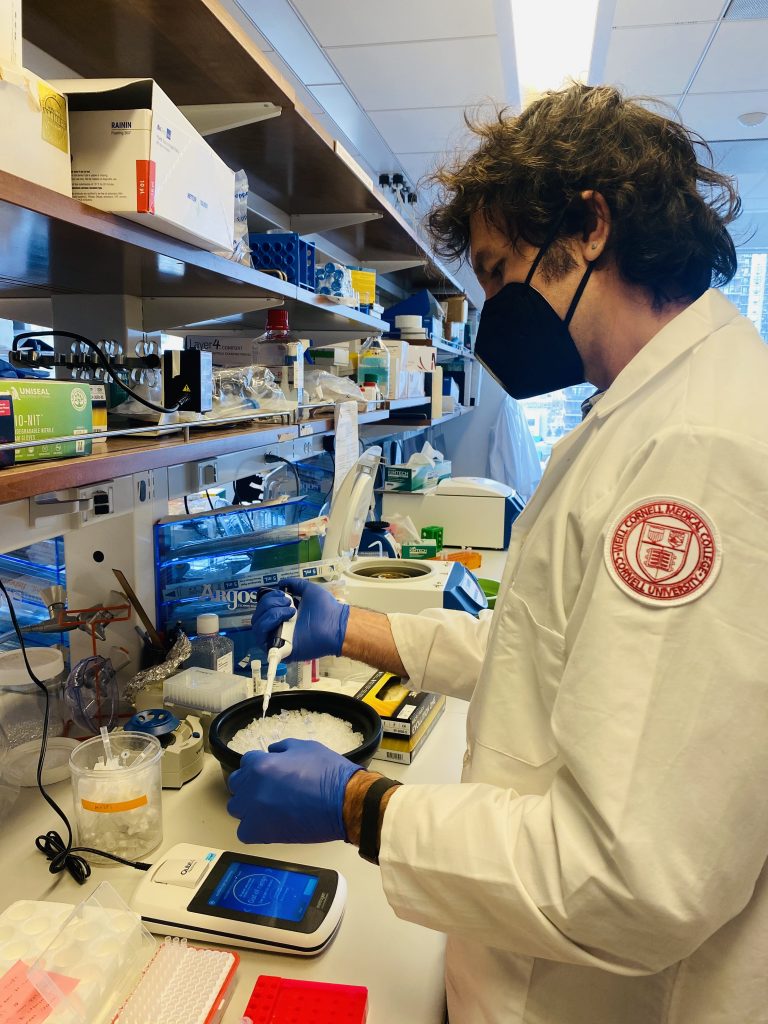Marcin Imielinski, MD, PhD ‹ Back To 2021 Winners
2021 Winners
Assistant Professor
Pathology and Laboratory Medicine
Weill Cornell Medicine
Vision
The $100 whole genome era is imminent and in this next era of clinical genomics we will approach a cancer whole genome like we do a CT, MRI, or pathology slide – a feature rich trove of data that we interpret with an open mind. I believe that the analysis of genome structure in particular will reveal how cancers have their hands tied evolutionarily. In this web of constraints, we will find specific vulnerabilities that we can exploit therapeutically to achieve complete and durable responses.
Marcin Imielinski MD, PhD is a physician-scientist and a leading innovator in the sequence analysis of cancer genomes, including computational methods to characterize cancer genome structure. His work has uncovered new classes of complex and noncoding somatic genetic alterations in cancer, including lung adenocarcinoma and acral melanoma. He is applying these discoveries to uncover therapeutic vulnerabilities in tumors with highly rearranged genomes and develop whole genome sequencing-based biomarkers for the precision oncology clinic. After earning a B.S. in Computer Science and B.A. in Biological Sciences from Rutgers College, he obtained his Ph.D. in Genomics and Computational Biology, and M.D. from the University of Pennsylvania School of Medicine. He then completed clinical pathology residency at Massachusetts General Hospital, molecular genomic pathology fellowship at Harvard Medical School, and postdoctoral research with Matthew Meyerson at the Broad Institute of MIT and Harvard. Since 2015, he has been an Assistant Professor of Pathology and Laboratory Medicine at Weill Cornell Medicine, Assistant Attending at New York Presbyterian Hospital, and Core Member at the New York Genome Center.
Evolution and antigenicity of complex amplicons
 Immunotherapy has transformed the care of advanced cancer, but only helps a subset of patients. Tumors that have many small mutations in their genomes are thought to be targeted by the immune system and hence respond to immunotherapy. These include most melanomas, which occur on sun-exposed parts of the skin. However, a substantial fraction of tumors with few small mutations still respond to immunotherapy. This includes acral melanomas which occur on the palms of the hands and soles of the feet. Many cancers with few small mutations have larger structural changes in their genomes, including rearrangements and amplifications. While these genetic changes may also be recognized by the immune system, they are mostly ignored in the clinic due to the cost and complexity
Immunotherapy has transformed the care of advanced cancer, but only helps a subset of patients. Tumors that have many small mutations in their genomes are thought to be targeted by the immune system and hence respond to immunotherapy. These include most melanomas, which occur on sun-exposed parts of the skin. However, a substantial fraction of tumors with few small mutations still respond to immunotherapy. This includes acral melanomas which occur on the palms of the hands and soles of the feet. Many cancers with few small mutations have larger structural changes in their genomes, including rearrangements and amplifications. While these genetic changes may also be recognized by the immune system, they are mostly ignored in the clinic due to the cost and complexity
of whole genome sequencing.
“The Prize will allow me to see whether patients with a certain class of structural genomic alterations respond better to immunotherapy and why.”
Our group recently developed innovative methods to characterize structural changes in whole genome sequences. We applied these methods to thousands of cancer samples to uncover tyfonas, a novel class of genetic alteration which causes a distinct pattern of rearrangements and amplifications in 40% of acral melanomas. Our study will examine whether tyfonas explain why acral melanomas and other similar cancers respond to immunotherapy. We will also develop an innovative experimental system to explain how tyfonas develop from normal unrearranged genomes. This study can transform our basic understanding of cancer evolution and provide evidence for a whole genome sequencing immunotherapy biomarker. As sequencing costs are poised to further plummet, our work may help finally bring whole genome sequencing into routine clinical oncology use.
“From my perspective, innovation involves deeply understanding a burning question or need then letting your brain get to work.”